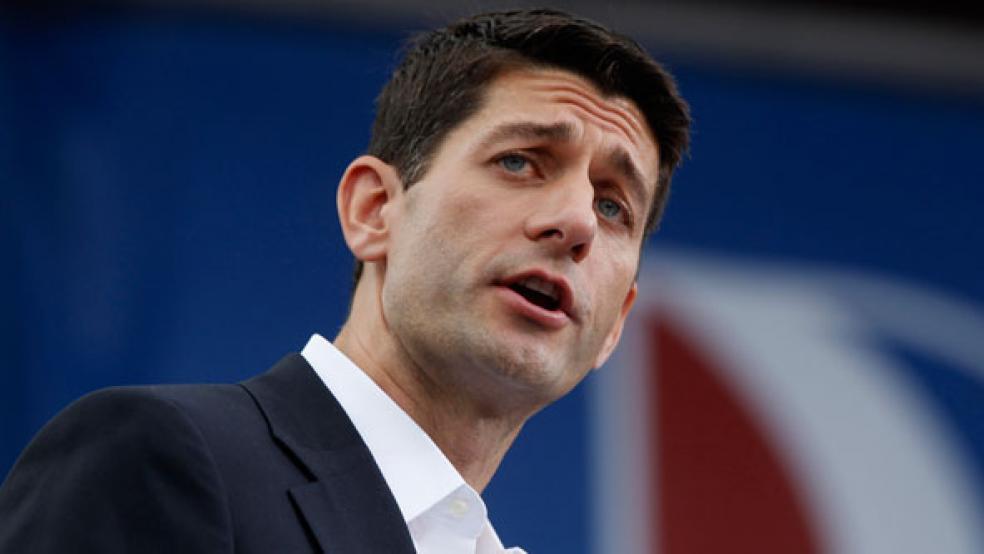If Paul Ryan has any lingering doubts about not running for president in 2016, he didn’t betray them on Friday during a highly enthusiastic and upbeat performance before a group of reporters on Capitol Hill.
The Representative from Wisconsin and new chair of the House Ways and Means Committee has been a leading architect of House Republican conservative budget and social policy over the past decade. He said he decided against entering the crowded GOP presidential field to pursue a golden opportunity to achieve historic tax and trade reform legislation and blaze new trails in health care, welfare and Social Security Disability Insurance.
Related: Obamacare Substitute in the Works from Ryan, Upton, Kline
“I didn’t run for president because I think the best place for me is right here,” Ryan said in kicking off an hour-long session. “And I think this is where I can do the most good. And so that means I want to get things done.”
The Ways and Means Committee has a remarkably broad jurisdiction. The former House Budget Committee chair and 2012 Republican vice presidential nominee laid out an ambitious agenda for his tax-writing and fiscal policy committee for the coming two years -- including what he hopes will be the first big phase of comprehensive tax reform within the next seven months.
“My guess is that tax reform is a 2015 thing for sure and has to be done by summer,” Ryan said, offering a forecast somewhat more optimistic than what other Republican leaders have been saying. Former Ways and Means Committee Chair Dave Camp (R-MI) drafted major tax reform legislation before he left Congress, but House GOP leaders decided against bringing it to the floor.
Ryan praised Camp’s ground-breaking effort and said it would provide his committee members with a useful jumping off point for finally enacting major tax reform for the first time since 1986. “If it goes past summer, it’s hard to see how it gets done.”
Sen. Orrin Hatch of Utah, the Republican chair of the Senate Finance Committee, said during a conference of tax lawyers and analysts in January, "Though there are disagreements on the details, there is bipartisan support for tax reform in Congress.”
Ryan agrees with that and believes Senate Republicans might be able to pick up at least six Democratic votes necessary to pass tax reform legislation without having to resort to parliamentary procedures like budget reconciliation to overcome a Democratic filibuster.
Related: U.S. Senate's Hatch sees support for tax reform
Presidential politics from the beginning permeated Ryan’s discussion and calculations of what would be doable before the presidential campaign heats up and subsumes congressional deliberations. While others in Congress including Sens. Rand Paul of Kentucky, Marco Rubio of Florida and Ted Cruz of Texas are clearly moving towards announcements formally entering the GOP presidential field, the 45-year-old Ryan seems energized by his decision to stay out of the race and focus on a legislative agenda.
Asked at one point whether he would consider running again for vice president if the 2016 GOP presidential nominee turned to him, as Romney did before, Ryan laughed and said, “That doesn’t happen twice. I’m not even thinking about that.”
Earlier this month, Ryan was highly dismissive of President Obama’s $4 trillion 2016 budget and related tax proposals, including more than $2 trillion of new taxes over the coming decade to finance expanded tax credits, benefits and other programs for the middle class. “We’re not going to raise taxes on the American people,” Ryan flatly told Treasury Secretary Jack Lew during a hearing on the president’s proposals before the Ways and Means Committee.
While saying he was disappointed that Obama has ruled out any attempt at revising the tax code for individuals in the near future, Ryan said today that he was still optimistic he could help forge a bipartisan coalition around reforms of tax law for corporations and small businesses -- and then put off a “Phase 2” rewrite of individual tax law.
Related: Obama’s $4 Trillion Tax-the-Rich Budget Called ‘Envy Economics’
“I very much believe in fundamental, comprehensive tax reform – flatter, fairer, simpler for everybody – businesses, families, individuals alike,” he said. But if we have to do tax reform in phases, in this divided government, I’m open to it, as long as the phases work well.”
While stressing the narrow time line for getting anything done this year on tax reform, Ryan provided few other specifics. For instance, he would not be pinned down about revenue targets or whether he would negotiate with Democrats and the White House on top tax rates. Nor did he offer specifics about provisions for small businesses that would be included in overall corporate reforms.
“I think for the next two years I basically have too goals in mind: Number one, we want to break new ground and put big ideas out there,” he said. “We think we owe the country a contrasting vision with the president’s, and we think we owe the country how we would do things differently and how we would make things better.”
“And number two, I also want to look for common ground,” he added. “These are not mutually exclusive goals. I want to look for areas of agreement with the president. And we’ll leave no stone unturned and I want to do whatever we can to move the country forward. And I would like to think there are areas where we can find common ground and get some things done.”
Top Reads from The Fiscal Times:





